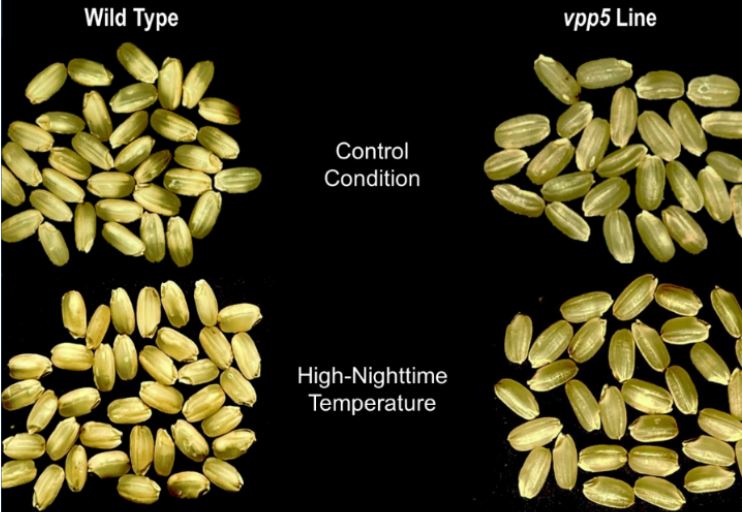
Targeted Mutagenesis by CRISPR Improves Grain Quality and Heat Resilience in Rice
June 29, 2023| |
Researchers at the University of Arkansas System Division of Agriculture (UADA) showed that by suppressing the activity of a grain-specific vacuolar H+ translocating pyrophosphatase (VPP5), chalk content of the grain could be reduced.
Grain chalk is an undesirable trait that impacts milling yield and cooking quality. Heat stress, specifically high nighttime temperature, is a major inducer of chalk, leading to yield losses and market value of rice. Based on the information that higher VPP5 activity leads to higher chalk content, Vibha Srivastava and her group at UADA used CRISPR-Cas9 to target promoter elements and suppress VPP5 activity during grain filling stages in rice. The resulting rice (vpp5 lines) showed 7 to 15-fold lower chalk content and improved grain weight. Most importantly, much lower chalk was induced by high nighttime temperature in vpp5 lines. Biochemical and gene expression analysis indicated improved starch biosynthesis and compact packing of starch granules as part of the mechanism.
Read the research article in Plant Journal for more information.
| |
You might also like:
- Pocket K No. 54: Plant Breeding Innovation: CRISPR-Cas9
- CRISPR-Cas9 Used to Increase Rice Resistance to Abiotic Stresses
- Single Guide RNA for CRISPR-Cas9 System Based on Rice Bacterial Blight Resistance Gene
Biotech Updates is a weekly newsletter of ISAAA, a not-for-profit organization. It is distributed for free to over 22,000 subscribers worldwide to inform them about the key developments in biosciences, especially in biotechnology. Your support will help us in our mission to feed the world with knowledge. You can help by donating as little as $10.
-
See more articles:
-
Plant
- Current State and Opportunities for Biotechnology in International Trade and Technology Transfer
- Computer Scientists Sequence Genome of African Domesticated Cotton
- Targeted Mutagenesis by CRISPR Improves Grain Quality and Heat Resilience in Rice
- ISAAA Inc. to Hold ASCA6 on September 11-15 in Indonesia
-
Animal
- Gene Editing Reduces Anxiety-Related Behavior in Mice
- Animal Biotechnology Symposium and Stakeholder Consultation
- ISAAA Launches Animal Biotech Resource Page
-
Food
- Cultivated Chicken from GOOD Meat and UPSIDE Foods Receive Full Approval from USDA
-
Environment
- ISAAA and DA Biotech Release New Resources on Biotech in the Philippines
-
Read the latest: - Biotech Updates (December 17, 2025)
- Gene Editing Supplement (December 17, 2025)
- Gene Drive Supplement (February 22, 2023)
-
Subscribe to BU: - Share
- Tweet

